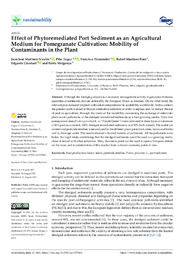Por favor, use este identificador para citar o enlazar este ítem:
https://hdl.handle.net/11000/34281Registro completo de metadatos
| Campo DC | Valor | Lengua/Idioma |
|---|---|---|
| dc.contributor.author | Martinez Nicolas, Juan Jose | - |
| dc.contributor.author | Legua, Pilar | - |
| dc.contributor.author | Hernández, Francisca | - |
| dc.contributor.author | Martínez Font, Rafael | - |
| dc.contributor.author | GIORDANI, EDGARDO | - |
| dc.contributor.author | Melgarejo Moreno, Pablo | - |
| dc.contributor.other | Departamentos de la UMH::Producción Vegetal y Microbiología | es_ES |
| dc.date.accessioned | 2025-01-10T17:00:31Z | - |
| dc.date.available | 2025-01-10T17:00:31Z | - |
| dc.date.created | 2021-08-27 | - |
| dc.identifier.citation | Sustainability 2021, 13(17), 9661 | es_ES |
| dc.identifier.issn | 2071-1050 | - |
| dc.identifier.uri | https://hdl.handle.net/11000/34281 | - |
| dc.description.abstract | Although the dredging of ports is a necessary management activity, it generates immense quantities of sediments, that are defined by the European Union as residues. On the other hand, the relevant peat demand for plant cultivation compromises its availability worldwide. In this context, the present work wanted to find an alternative substrate in order to replace and/or reduce the use of peat in agriculture, through the study of the suitability, concerning the exchange of substrate–plant–water pollutants, of the dredged remediated sediments as a fruit-growing media. Forty-five pomegranate trees (Punica granatum L. cv “Purple Queen”) were cultivated in three types of substrates (100% peat as a control, 100% dredged remediated sediments and 50% both mixed). The metal ion content and pesticide residues were analysed in the different plant parts (root, stem, leaves and fruits) and in drainage water. The results showed a limited transfer of pollutants. All the pollutants were below the legal limits, confirming that the dredged sediments could be used as a growing media, alone or mixed with other substrates. Thus, the results point out the need to open a European debate on the reuse and reconsideration of this residue from a circular economy point of view | es_ES |
| dc.format | application/pdf | es_ES |
| dc.format.extent | 16 | es_ES |
| dc.language.iso | eng | es_ES |
| dc.publisher | MDPI | es_ES |
| dc.rights | info:eu-repo/semantics/openAccess | es_ES |
| dc.rights | Attribution-NonCommercial-NoDerivatives 4.0 Internacional | * |
| dc.rights.uri | http://creativecommons.org/licenses/by-nc-nd/4.0/ | * |
| dc.subject | Fruit production | es_ES |
| dc.subject | Heavy metal | es_ES |
| dc.subject | Pesticide residue | es_ES |
| dc.subject | Punica granatum L. | es_ES |
| dc.subject | Port sediment | es_ES |
| dc.title | Effect of Phytoremediated Port Sediment as an Agricultural Medium for Pomegranate Cultivation: Mobility of Contaminants in the Plant | es_ES |
| dc.type | info:eu-repo/semantics/article | es_ES |
| dc.relation.publisherversion | https://doi.org/10.3390/su13179661 | es_ES |

Ver/Abrir:
Effect of phytoremediated port sediment as an agricultural.pdf
726,22 kB
Adobe PDF
Compartir:
 La licencia se describe como: Atribución-NonComercial-NoDerivada 4.0 Internacional.
La licencia se describe como: Atribución-NonComercial-NoDerivada 4.0 Internacional.
.png)